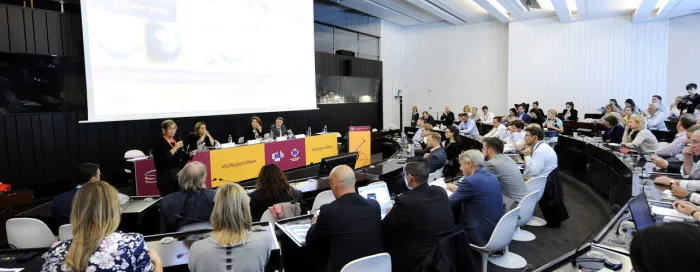The PES Group workshop started with a presentation of the proposal for the new ESF+, followed by an overview of examples of how the ESF is currently implemented on the ground. It was then discussed what lessons can be learned for the next programming period.
Loris Di Pietrantonio, Head of Unit responsible for the ESF in the European Commission's Directorate General for Employment, Social Affairs & Inclusion, gave an overview of the Commission proposal on the new ESF+. He underlined that the ESF+ was the EU's financing arm for implementing the standards of the European Pillar of Social Rights in all Member States. The proposal responds to a social challenge, a simplification challenge, and a budgetary challenge. Di Pietrantonio insisted that, despite budgetary restraints, the ESF's share within the European Structural and Investment Funds has increased to 27%. He also stressed that regional and local authorities play an important role in ESF +, as they provide the ingredients for the design, implementation and evaluation of the programmes.
Nathalie Sarrabezolles, President of the Finistère Council, France, and CoR member, reported on her experience of using the ESF on the ground, explaining that it is used for investments in social innovation projects such as mobility platforms in rural areas, the establishment of "health mediators" or the use of social inclusion clauses in public procurement. She emphasised that an important element for success was creating partnerships with other actors on the ground. The future ESF+ should make the regional and local approach and the issue of solidarity more visible. Moreover, in terms of social experimentation, structures that can take a risk in social innovation need to be better encouraged.
"In Finistère, we decided to invest in human capital and #SocialInnovation. With the ESF we were able to support mobility platforms, improve access to social services, fund inclusion of unemployed people."@NSarrabezolles shares her experience at local level at #EURegionsWeek ⬇️ pic.twitter.com/hiyzle0txc
— PES Group CoR (@PES_CoR) October 10, 2018
Catiuscia Marini, President of the PES Group in the European Committee of the Regions and President of the Umbria Region, Italy, emphasised that the debate about the future ESF+ was part of a broader debate about the need for a more social Europe, based on the principles of solidarity, equality and inclusion. In times of growing populism, ensuring strong social protection and access to quality jobs for all is an essential means of rebuilding citizens' confidence in the European project. She stressed that, in order to successfully tackle a wide range of local challenges, the future ESF + needs to be driven from the ground. The negotiations for the next Multiannual Financial Framework should allocate to cohesion policy, and in particular to the ESF, a budget commensurate to the many challenges at hand.
"The ESF is not only a financial instrument but is the key to the #FutureOfEurope. As progressives, we believe that the European Union needs to be more social. There cannot be cohesion in our Union without a pillar of #SocialRights."@CatiusciaMarini at #EURegionsWeek ⬇️ pic.twitter.com/3IY5FGWOw5
— PES Group CoR (@PES_CoR) October 10, 2018
The discussions will feed into the CoR opinion on the new ESF +, drafted by PES Group member Susana Díaz Pacheco, President of the Andalusia Region, Spain, due for adoption at the CoR's December plenary session.
